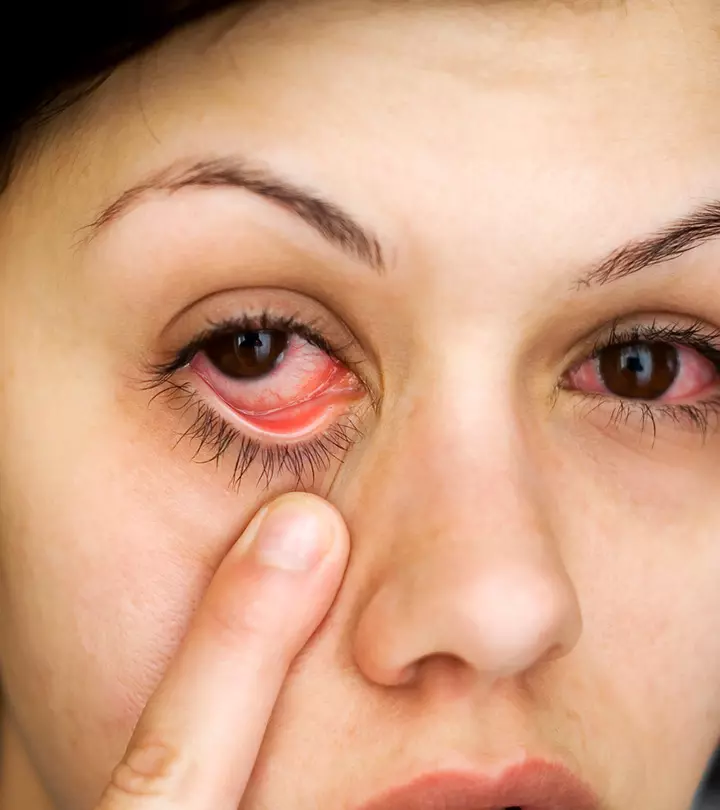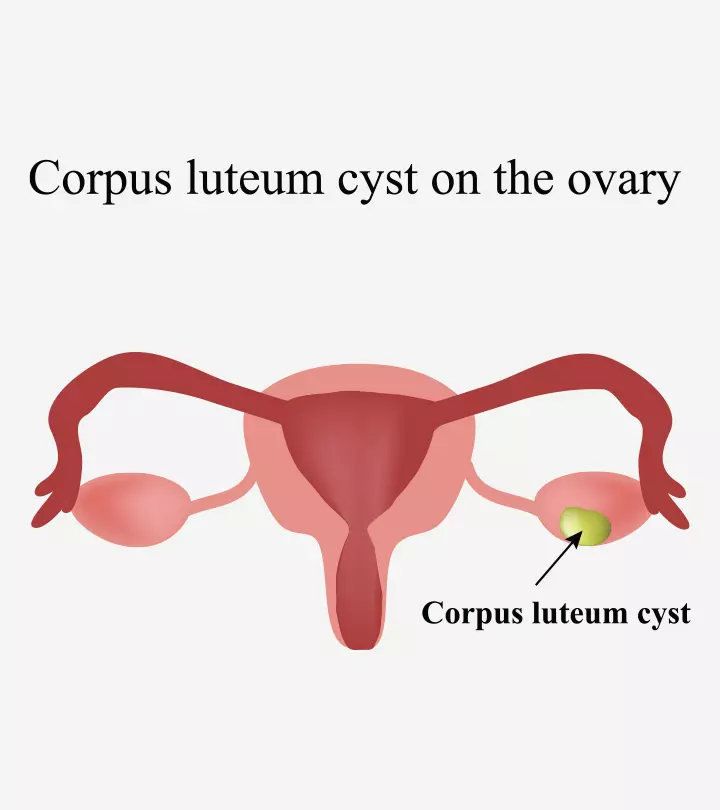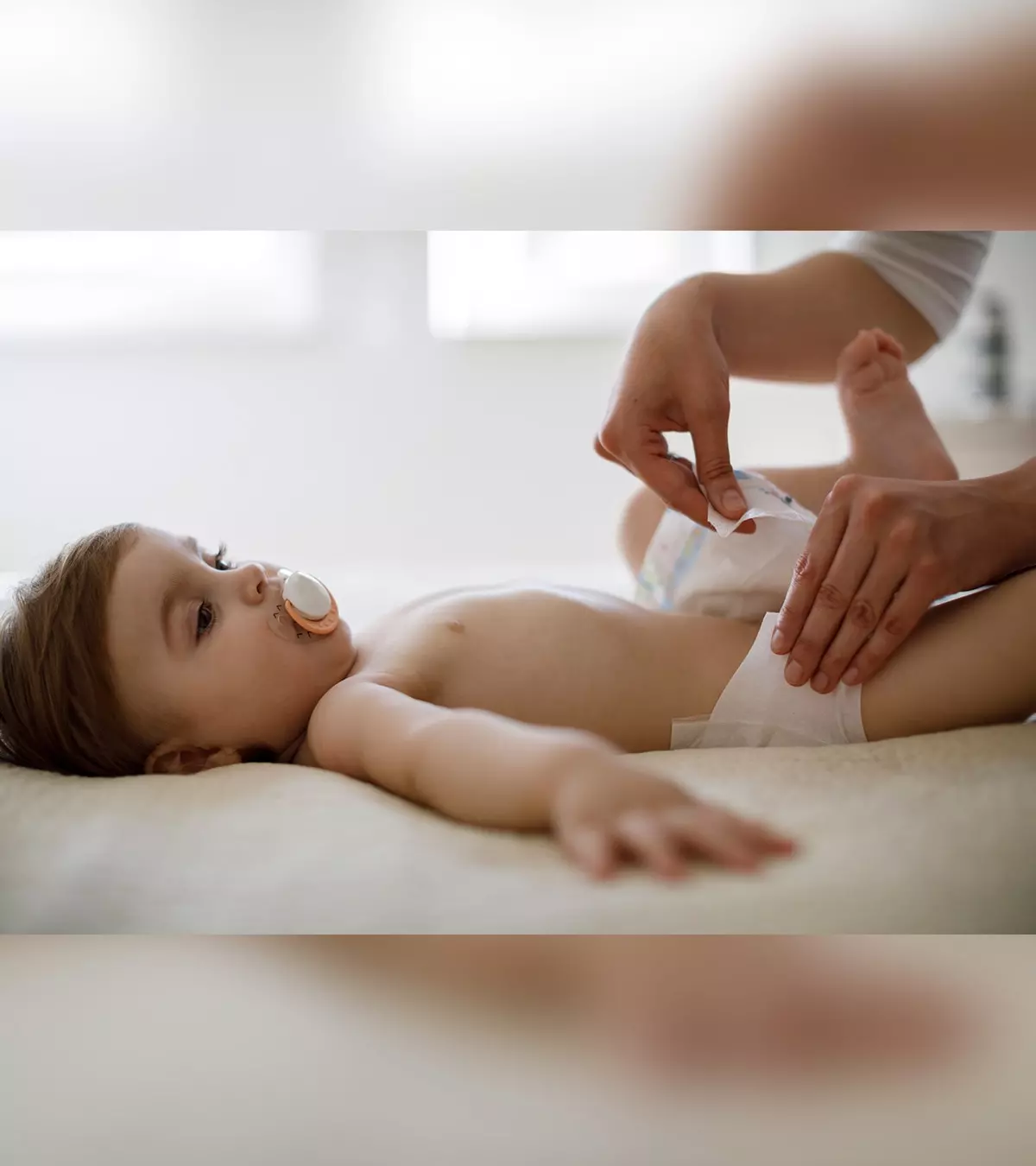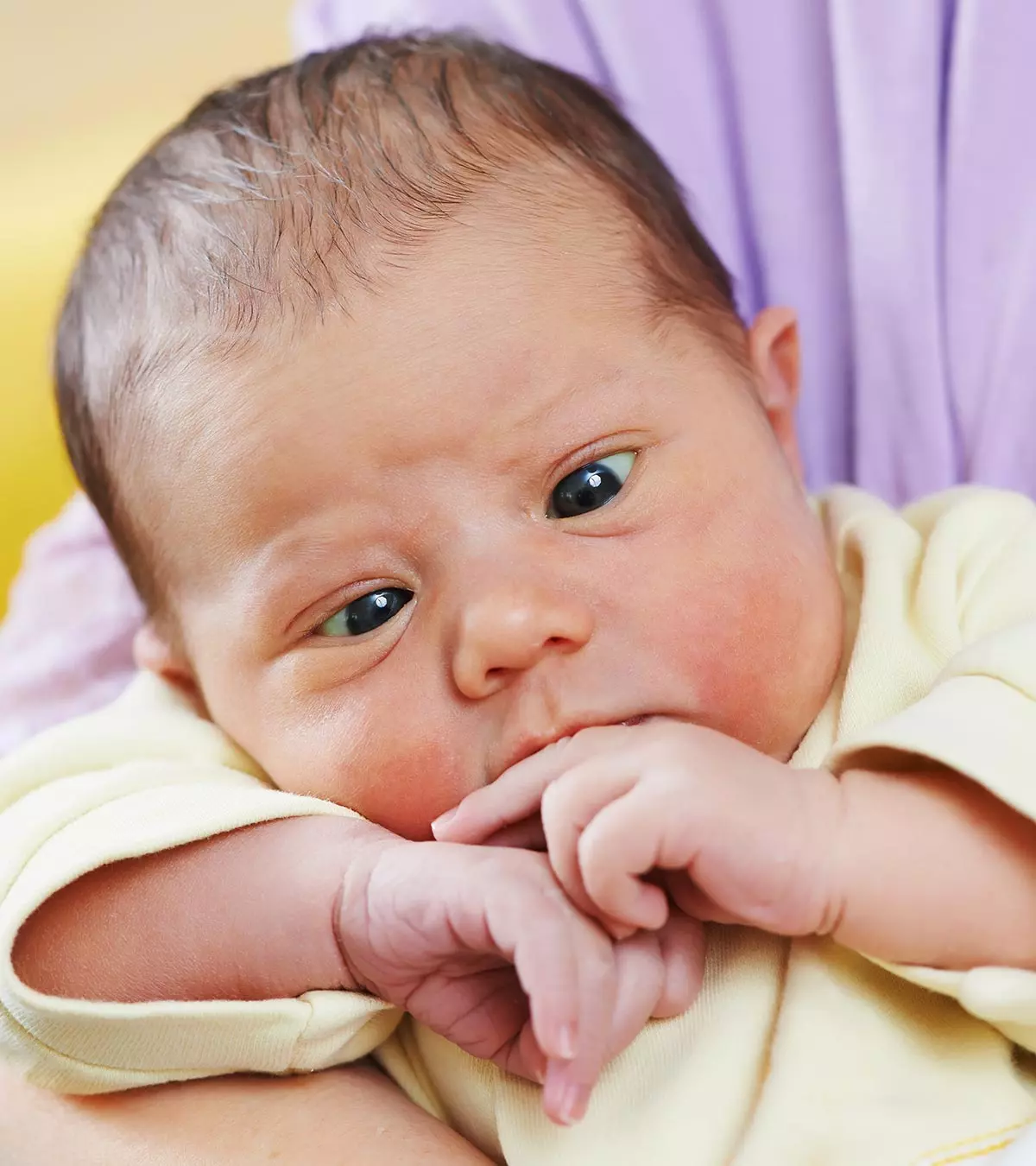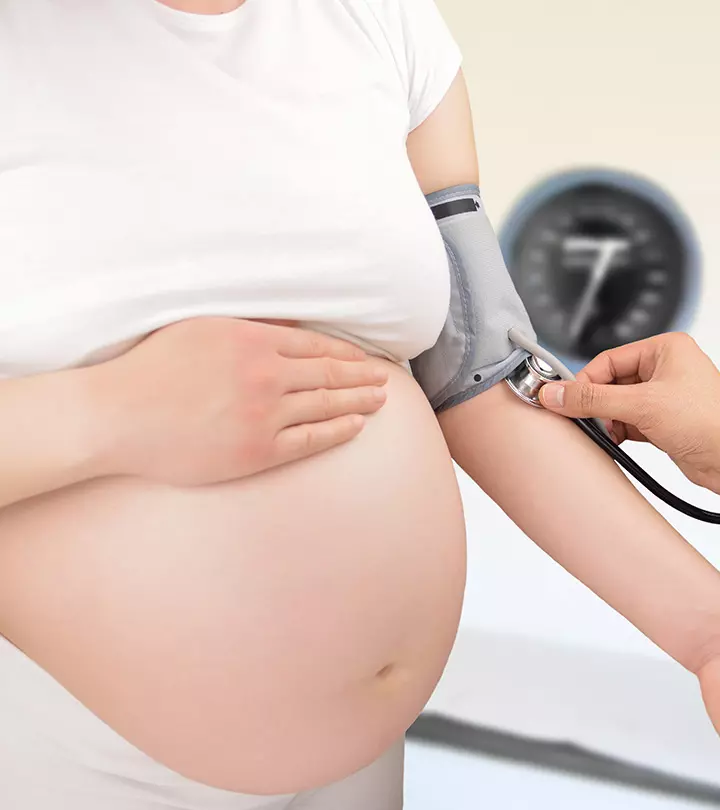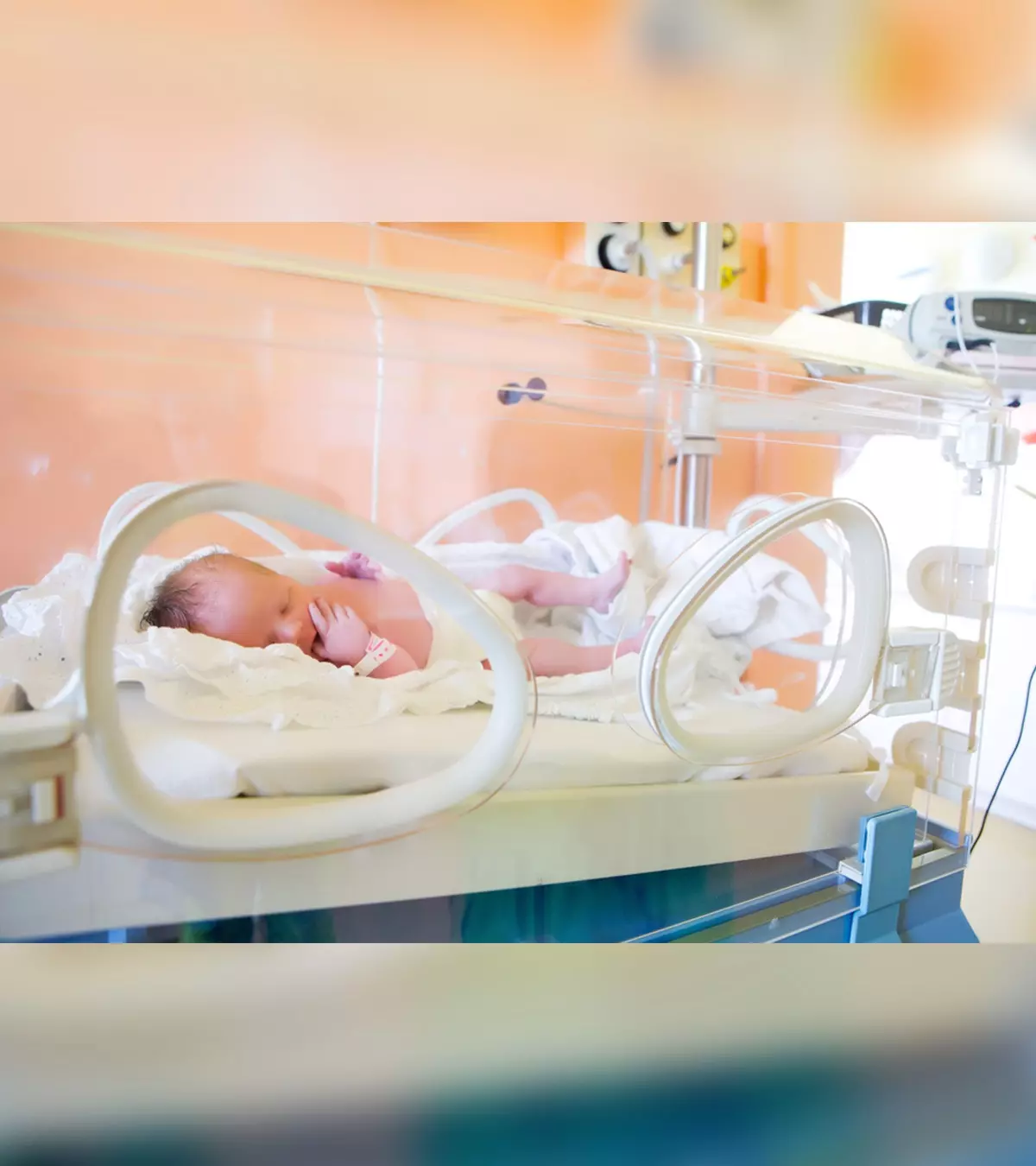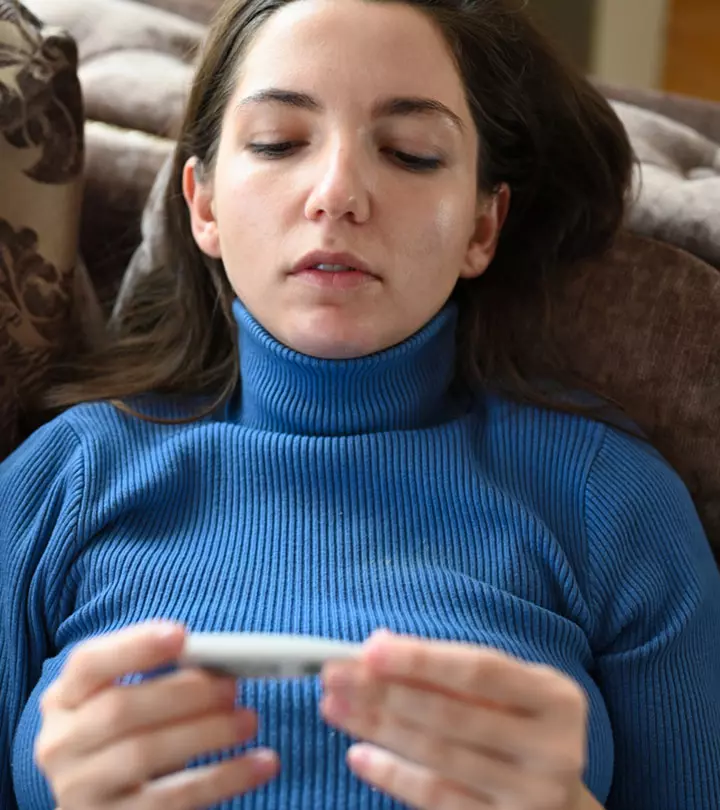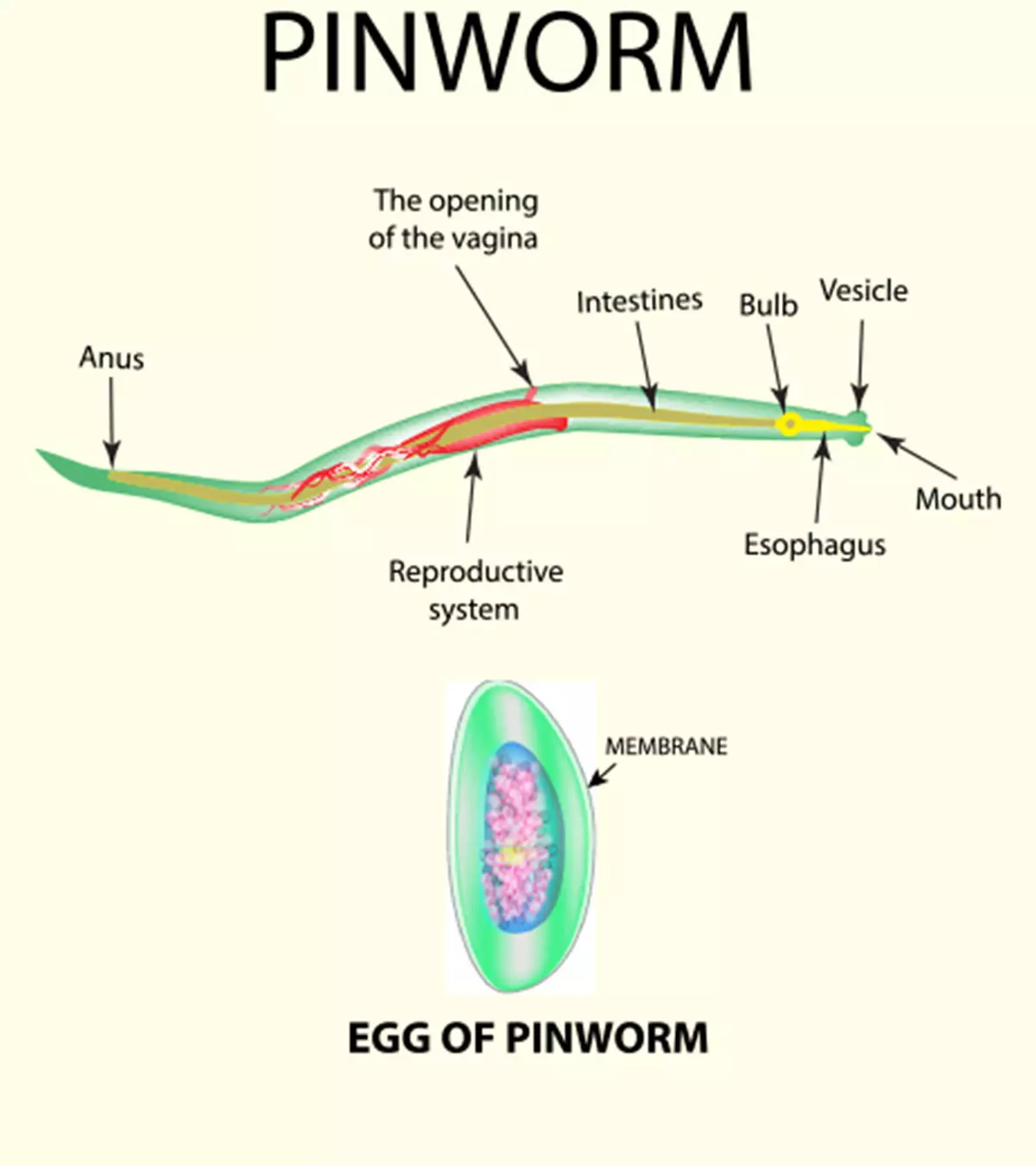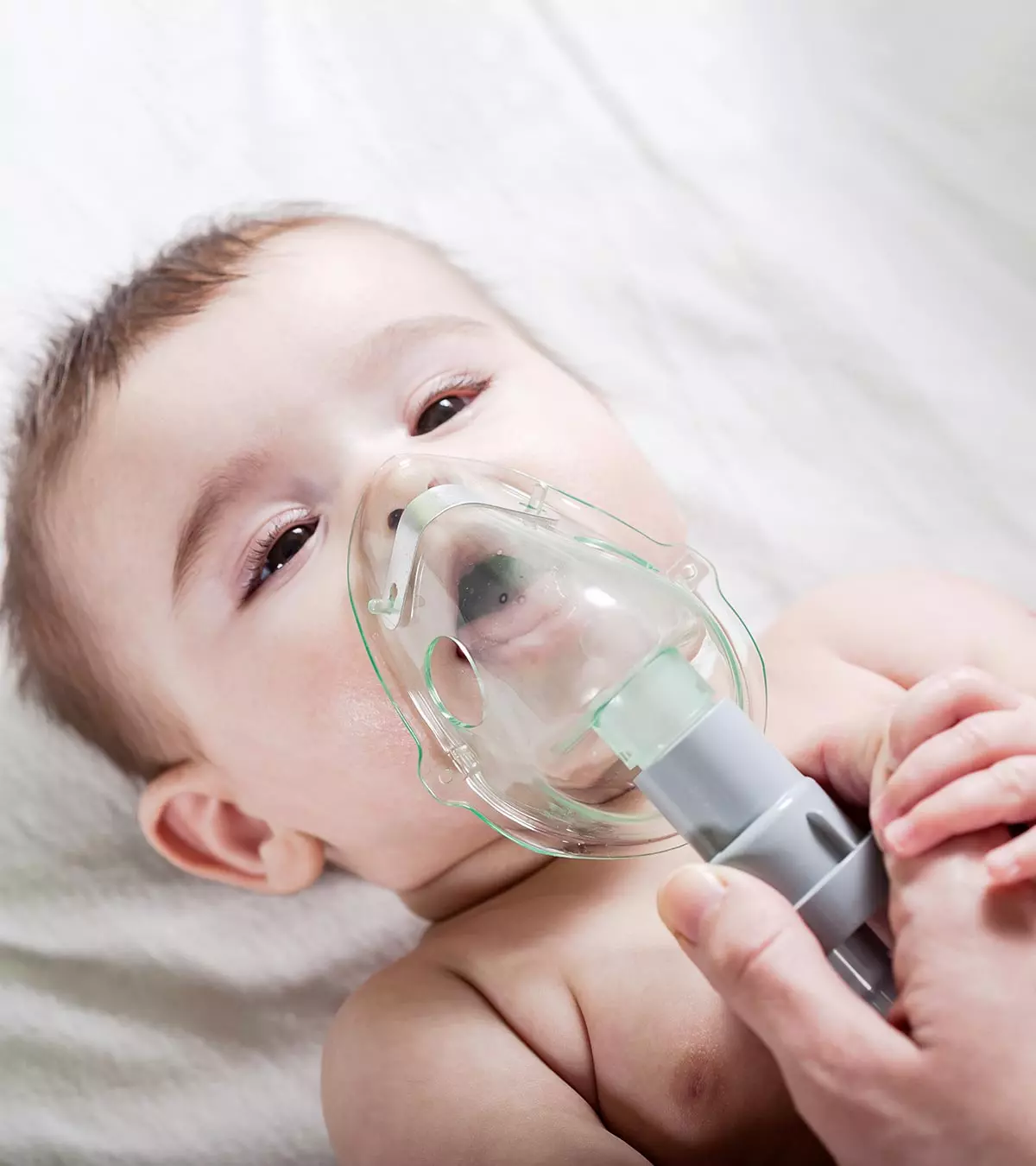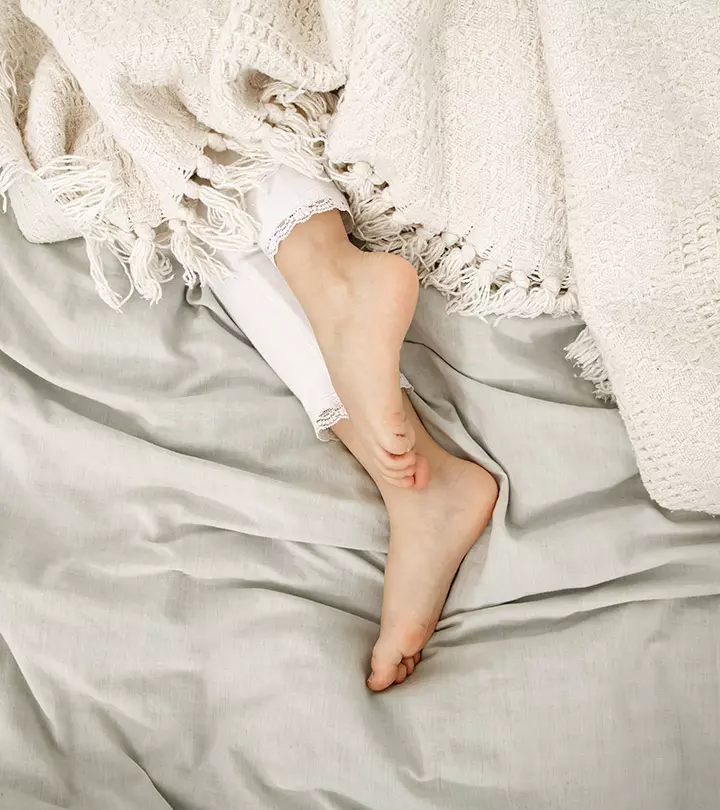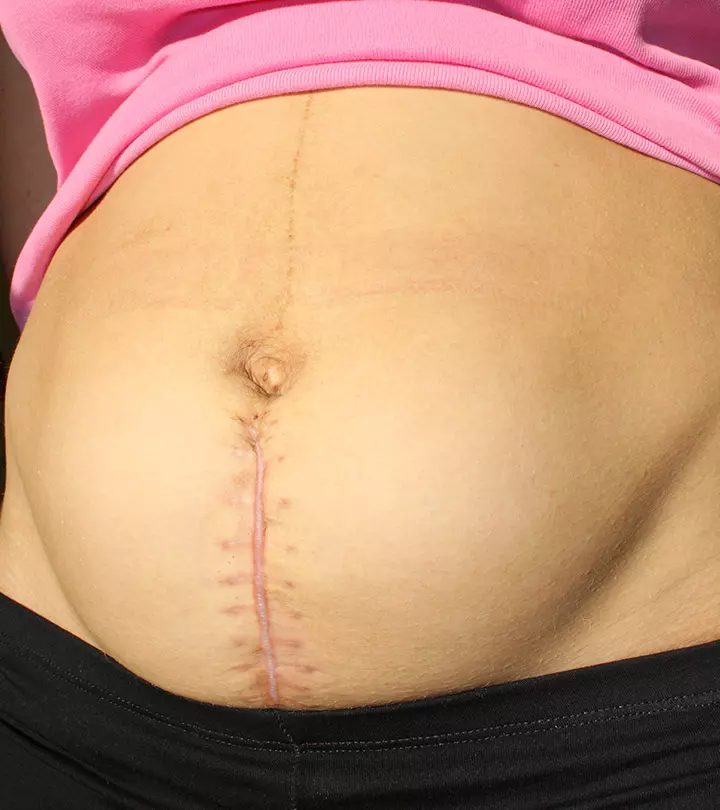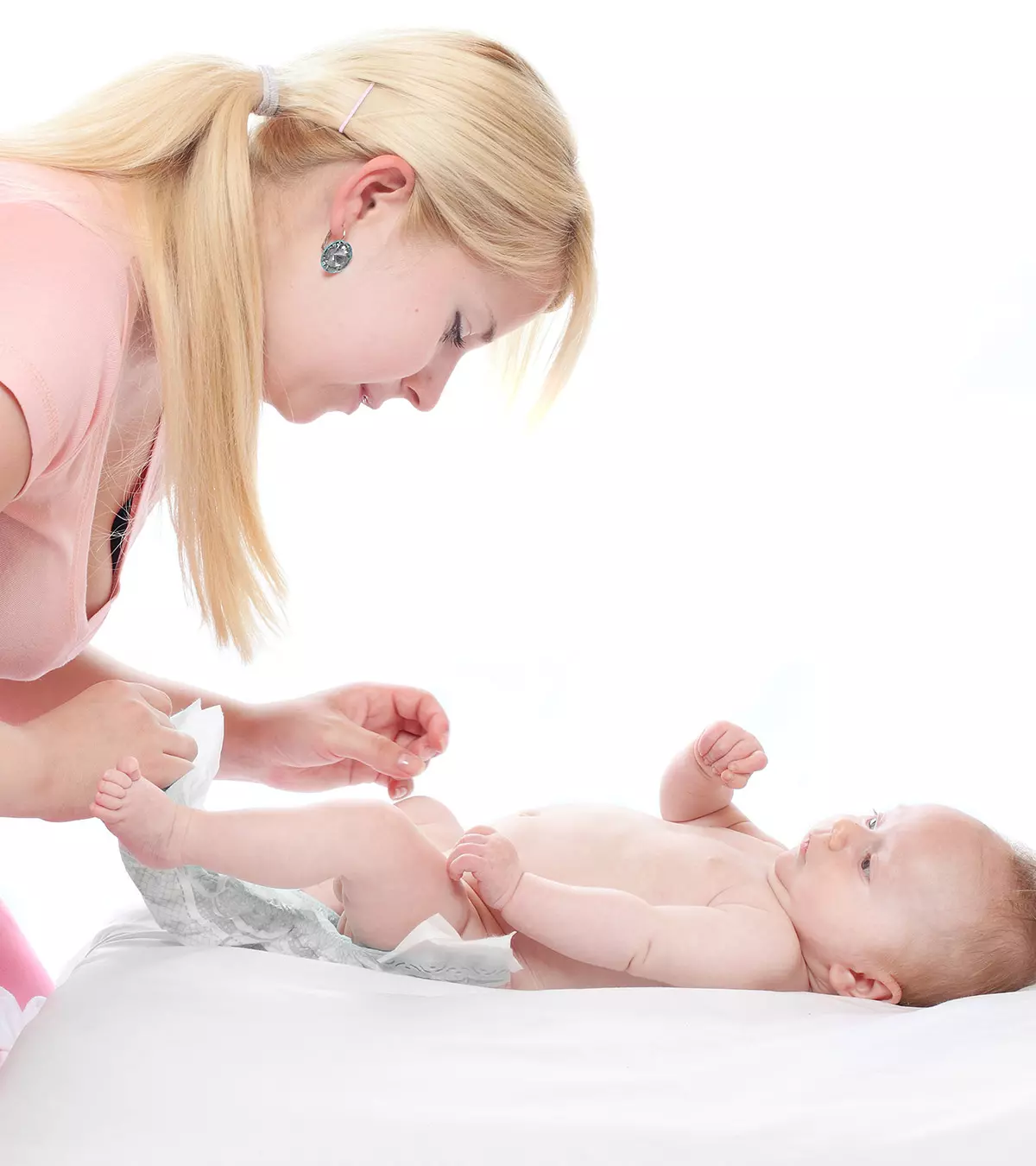
Image: ShutterStock
Diarrhea in babies can be a stressful experience for both the baby and the parents. The onset of diarrhea causes significant water loss through the stool, making the baby dehydrated and weak. It can affect babies of any age, and the numerous tries to replenish the amount of the fluids they have lost seems to make no difference at all, as they poop as often as they eat.

Diarrhea can also lead to other collateral complications in babies, making the situation more severe if not treated at the earliest. Read on to know more about diarrhea, its causes, treatment, and preventative measures.
Key Pointers
- An infection or an allergy can cause a baby to frequently pass loose stool throughout the day, resulting in diarrhea.
- Viral or bacterial Infections, use of certain medications, allergies, digestive issues, and heat exhaustion can cause diarrhea in infants.
- Seek immediate medical attention if the baby is irritable, has a fever, bloody stool, dehydration, and dry mouth.
- Managing the condition involves using antibiotics, maintaining diaper hygiene, giving the baby an ORS solution, and administering small meals.
- Avoid giving cow’s milk, fruit juice, fried and greasy food, and gas-forming fruits and vegetables to an infant suffering from diarrhea.
What Is Diarrhea?
Diarrhea is repeated bouts of watery stool occurring multiple times in a day. The World Health Organisation defines it as the passage of three or more watery stools in a day (1). Paste-like or runny baby poop, or passing multiple firm (normal) stools in a day is not diarrhea.
An acute diarrhea is caused by a bacteria or viral infection. A recurrent diarrhea is when the infant passes loose stools due to an internal biochemical problem such as a food allergy.
Diarrhea Scale
The American Academy of Pediatrics defines the severity of diarrhea on the following scale (2):
- Mild diarrhea is two to five watery stools in a day
- Moderate diarrhea is six to nine watery stools in a day
- Severe diarrhea is ten or more watery stools in a day
There are several conditions that can trigger diarrhea in babies.
What Causes Diarrhea In Infants?
Following are the reasons behind the watery stools:
1. Stomach or intestinal infection:
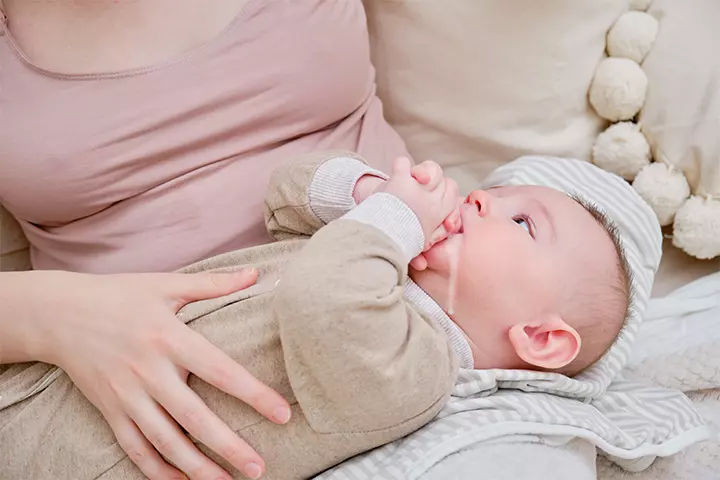
Infections of the gastrointestinal tracts, caused mostly due to virus and bacteria, can lead to food poisoning and diarrhea. These microbes could enter through contaminated or under-cooked food. They can also occur due to poor hand washing and spreading germs through saliva.
- Rotavirus, which affects even newborns, causes acute infantile gastroenteritis, eventually leading to cough and diarrhea. According to the WHO, rotavirus infection is the leading cause of infant mortality, but it can be prevented through immunization (3).
- Adenovirus are a group of viruses that infect different parts of the body including the inner linings of the gastrointestinal tract. They can easily spread through coughing, sneezing, and coming in contact with a contaminated surface.
- Salmonella bacteria can infect the digestive system, specifically the stomach, and intestines, resulting in symptoms such as severe diarrhea and stomach upset (4). The infections spread through contaminated food and water, or surfaces. Babies tend to put objects in their mouth, which exposes them to the risk of contracting the virus.
- E.coli or Escherichia coli causes severe stomach pain and diarrhea, and can lade the baby’s stools with mucus and blood (5). The bacteria spreads through contaminated food and poor sanitation.
- Parasitic infection, caused by microscopic parasites, affects the gastrointestinal tract causing diarrhea. Giardia lamblia and Cryptosporidium species are some parasites that spread through contaminated water and food (6).
- The norovirus virus is highly contagious and causes vomiting and diarrhea (7).
2. Food intolerance or allergy:
If a baby is allergic to some food, it means that his immune system mounts an attack against it. In case of food intolerance, the baby’s digestive system cannot digest the food, causing discomfort in the gastrointestinal tract.
3. Inflammatory bowel disease:
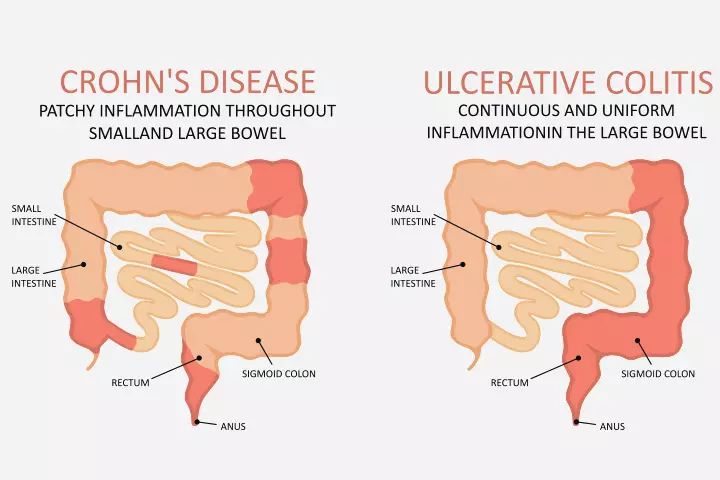
It is a group of gastrointestinal diseases caused by genetic anomalies that lead to painful inflammation of the inner lining of the digestive tract. Ulcerative colitis and Crohn’s disease are inflammatory bowel diseases that can affect infants, causing persistent diarrhea (8). Inflammatory bowel disease is genetic and has no treatment. Medications should be taken every day to relieve the intensity of the symptoms.
4. Fruit juice:
Fruit juices come loaded with nutrients, but sometimes they can be too much to handle for an infant’s little body. Malabsorption and nutrient overload expel these excess nutrients in the form of watery diarrhea (9). The American Academy of Paediatrics recommends against giving fruits juices to babies below one year (10). Whole fruits are better as they are rich in fiber and have tolerable levels of nutrient concentration.
5. Heat exhaustion:
Babies are poor at adjusting to extreme temperatures. If the baby is in a hot climate for long he may suffer from dehydration and headaches due to loss of body water. In extreme cases, he may also have abdominal cramps and diarrhea (11). The baby must be in cool or moderate temperatures and should be given adequate fluids.
6. Antibiotics:
Infant diarrhea can be a side effect of antibiotics as they act against bacteria. They kill the good intestinal bacteria, and digestion becomes difficult (13). The baby’s condition improves when the antibiotic course is concluded.
Diarrhea in babies can last from a couple of days to weeks depending on the intensity of the condition. This makes it imperative to know what to expect when a baby is going through a bout of diarrhea.
7. Irritable Bowel Syndrome:
It is a collection of symptoms that may include abdominal pain, alteration in bowel movements, bloating, constipation, and diarrhea (12).
 Point to consider
Point to considerWhat Are The Symptoms Of Diarrhea In Babies?
Diarrhea is a symptom in itself but you can differentiate it from a normal stool through these attributes:
- Baby poops more than normal: A healthy, breastfed infant will have at least six to ten stools a day. It can even be as less as once a week or as frequent as after every breastfeeding session. Formula-fed infants tend to pass stool fewer times that is around four times in a day. The frequency of pooping decreases after two months. Each infant’s schedule is different from the other poops differently. But if there is a sudden increase in the number of stools and the stools are visibly watery, then it is likely that the baby is suffering from diarrhea.
- Smelly and mucus-laden stool could indicate diarrhea: If an infant has mucous-like and foul-smelling stool, then it could indicate diarrhea. Infant stools are yellow to brownish-yellow in color. The color of a baby’s stool could depend on the food eaten. Also, a baby could excrete a greenish colored stool due to the liver bile that passes into the gastrointestinal tract, and is absolutely normal.
Watery stools are a sure-shot indicator of diarrhea and could be accompanied by symptoms such as abdominal cramping, fever, etc., depending on the underlying cause of diarrhea. These symptoms indicate that you must take your baby to a doctor.
When To Rush The Baby To The Doctor?
In 2019, approximately 370,000 children died due to diarrheal disease, making it the second most prominent cause of death for children under five, according to the World Health Organization (WHO). Therefore, prompt medical attention is of utmost importance. The following conditions demand prompt medical attention:
- Baby’s stool has blood or a reddish blood clot.
- The baby is irritable, has little energy, and appears drowsy all the time.
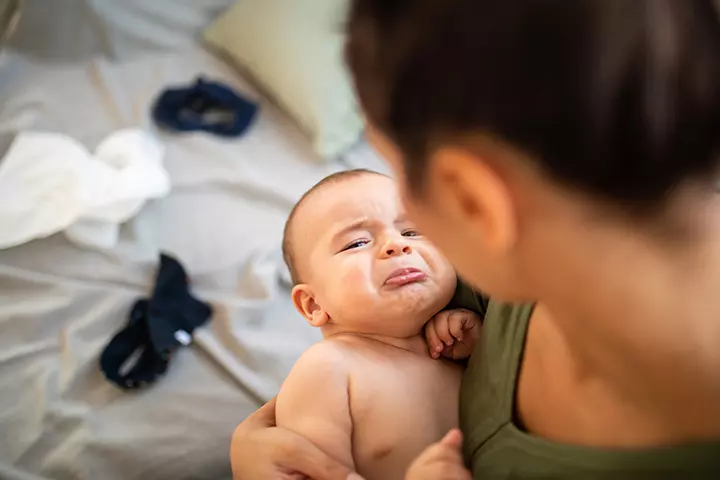
- The infant has not urinated for more than 12 hours, which could be a sign of dehydration.
- The baby drools less than normal due to dry mouth.
- The baby has diarrhea and a persistent fever with a body temperature of over 100.4°F (38°C).
The American Academy of Pediatrics recommends medical intervention in any case of diarrhea in infants below three months (14).
How Is Diarrhea Treated?
A doctor initiates the treatment once the reason behind diarrhea is diagnosed. The medication varies according to the problem and its severity. For instance, if the baby has diarrhea due to a bacterial infection, then antibiotics would be prescribed. Over-the-counter medications such as Pepto-Bismol and Kaopectate are available to treat diarrhea. However, the US Food and Drug Administration recommends against them as they contain chemical compounds that may harm the baby. It is best to consult a doctor to avoid any complications to the infant.
 Quick fact
Quick factWhat Are The Complications Of Untreated Infant Diarrhea?
Diarrhea may not come alone always. It could, sometimes, lead to further complications, such as:
- Dehydration: The baby loses a lot of water, causing fluid and electrolyte imbalance in the body. Such a condition leads to dehydration, and severe dehydration can make the baby lose as much as 3% of her body weight. More serious outcomes are disorientation and unconsciousness.
 Be watchful
Be watchful- Diaper rash: Babies develop diaper rash from frequent pooping and wiping (15). Diaper rashes can get sore and troublesome and pose a challenge.
The baby’s treatment needs to be complimented with home care for the little one to recover soon.
Caring For An Infant With Diarrhea
Here are three simple ways to care for the baby when she is suffering from diarrhea:
- Give plenty of fluids: Besides breastmilk and water, you must supplement the electrolyte loss with an electrolyte solution like oral rehydration salt (ORS) solution. Give two tablespoons of ORS solution to the baby every 30 minutes or as per the directions of your doctor. These solutions can help replenish lost fluids and electrolytes effectively. Also, babies less than six months should not be given ORS unless directed by a doctor. However, breast milk is always a safe option and the American Academy of Pediatrics recommends frequent breastfeeding to an exclusively breastfed infant during diarrhea (16).
- Small and regular meals: Diarrhea exhausts a baby, and food is vital for providing adequate calories. Exclusively breastfed babies rely only on breastmilk for nourishment. So, increase the frequency of feeding. For older infants, you can prepare small solid meals that can be fed once every three to four hours.
- Maintain diaper hygiene: Hygiene is a must and during diarrhea episodes to keep the diaper area dry and clean. Wash the baby’s bottom with soapy water, wipe it clean with sterilized baby wipe, and then wait until it is completely dry before wrapping a fresh diaper. Apply a thick layer of barrier cream such as Vaseline or zinc oxide.

What To Feed A Baby With Diarrhea?
If the baby is younger than six months, then you can safely feed breastmilk or milk-based formula except if diarrhea is caused by formula intolerance or lactose intolerance. In such cases, the doctor will prescribe a non-milk based or hydrolyzed protein formula that is easy to digest (17). If the baby is older than six months, you can feed (18):
- Applesauce
- Mashed bananas
- Boiled and mashed potatoes
- Plain white rice porridge
- Cooked and tender root vegetables such as carrots and beetroots
- Baby cereals made from wheat or oatmeal
- Meat stock/broth
You can give fruits to a baby with diarrhea, but remove the skin and seeds as they are hard to digest. Formula-fed babies can continue feeding the normal way.
Here are some food items that you must avoid in infant diarrhea:
- Cow’s milk and dairy products such as cheese and butter
- Foods with milk and high sugar content such pastries, cream biscuits, etc.
- Fruit juice
- Fried and greasy foods
- Some fruits and vegetables that form a lot of gas in the gastrointestinal tract or stomach, such as peas, chickpeas, green leafy vegetables, broccoli, prunes, and spices such as peppers
Remember to feed the infant several small meals in a day instead of three or four large meals. The baby must also have adequate rest, which combined with hydration and medication will surely help the little one recover easily. Diarrhea can be a tough phase, but it is easily preventable.
How To Prevent Diarrhea In Infants?
There are some simple ways to keep diarrhea at bay.
- Maintain good hygiene around the baby. Infants tend to put things in mouth, thus ingesting diarrhea-inducing pathogens. Keep the infant’s surrounding and toys clean. Wash the baby’s hands regularly.
- Give hygienically prepared food. Feed the infant with properly cleaned and cooked vegetables and fruits. Never give frozen foods, including frozen vegetables, as they could contain bacteria that may not harm adults, but affect infants. Make sure the water you drink is clean either through purification or boiling.
- Family members should maintain healthy personal hygiene. Wash your hands before you handle any of the baby’s items. It helps prevent transmission of germs from you to the baby.

Frequently Asked Questions
1. Does teething cause diarrhea in babies?
It is a common belief that teething in babies causes diarrhea. However, studies show that teething and diarrhea are unrelated, and if your child shows symptoms of diarrhea, you must check with a doctor (19).
Sree Madhanam, a mother and avid blogger, shares about her baby’s diarrheal episode. She writes, “I have never had the problem with diarrhea (in my baby) until very recently. When the kiddo started with the problem, my initial reaction was ohh okay she is teething, the gums are hard and that is why..but then, when the frequency increased to alarming proportions to the point where just water was being forced out, I was panicky.
“The first thing the hospital staff told me to do was to stop giving milk, fruits, and juice and give her saggubiyyam jaava (sago) prepared in water and sugar. It was to keep the baby hydrated before I take her to the hospital or before the diarrhea subsides. They also asked to start Pedialyte. (my kid was adamant about drinking it, so I had to mix formula with that and feed her (i).” The staff also gave other options like annam ganji (water while cooking rice), pappu teta (water after boiling daal), and diluted buttermilk with a pinch of salt and sugar to keep the baby hydrated.
2. Can breast milk cause diarrhea in babies?
Sometimes, babies react to breastmilk after eating or drinking a specific food. It indicates their sensitivity or allergy to that specific food. If you feel that a particular food is causing diarrhea in your baby, you may stop eating or drinking it for some time (20).
3. Does gripe water help babies with diarrhea?
According to WHO, breast milk is sufficient for a baby’s growth and development until six months. So, they should not be given any other food or drink unless prescribed by a doctor. Apart from that, the safety of gripe water is contradictory. Studies show that gripe water’s alcohol and sugar content may harm your baby (21).
Diarrhea in babies could be mild to severe and several conditions, such as infection or inflammatory bowel syndrome, cause it. During this time, they lose a sufficient amount of fluids. Therefore, you must give them enough fluids to make up for the water loss and ensure that they have enough rest. Try giving them light and nutritious meals, such as mashed bananas or plain white porridge. But if you notice signs of blood in their stool and accompanied by fever, it is advised that you take them to the doctor immediately.
Infographic: How Should You Give Liquids To Your Baby With Diarrhea?
Diarrhea causes a loss of fluids from the body. Parents must know the right type and quantity of fluids they may give the baby to compensate for fluid loss and prevent dehydration. This infographic provides this information. Save it for future reference.
Some thing wrong with infographic shortcode. please verify shortcode syntax
Some thing wrong with illustration image shortcode. please verify shortcode syntax
You will undoubtedly be concerned if your baby has diarrhea. Ensure that you keep them hydrated and consult your doctor for advice. Watch this video to have a better idea of how to deal with the situation.
Personal Experience: Source
MomJunction articles include first-hand experiences to provide you with better insights through real-life narratives. Here are the sources of personal accounts referenced in this article.
i. Motions/Diarrhea.https://sree-firststeps.blogspot.com/2009/11/
References
- Diarrhoeal disease.
https://www.who.int/en/news-room/fact-sheets/detail/diarrhoeal-disease - Diarrhea.
https://www.healthychildren.org/English/tips-tools/symptom-checker/Pages/symptomviewer.aspx?symptom=Diarrhea - Rotavirus.
https://www.who.int/teams/immunization-vaccines-and-biologicals/diseases/rotavirus - Salmonella Infections.
https://www.healthychildren.org/English/health-issues/conditions/infections/Pages/Salmonella-Infections.aspx - Doyle J. Evans, Jr. and Dolores G. Evans; (1996); Escherichia Coli in Diarrheal Disease.
https://www.ncbi.nlm.nih.gov/books/NBK7710/ - About Cryptosporidiosis.
https://www.cdc.gov/cryptosporidium/about/index.html - About Norovirus
https://www.cdc.gov/norovirus/about/index.html#:~:text=Norovirus%20is%20a%20very%20contagious,can%20make%20other%20people%20sick - Michael D. Kappelman and Richard J. Grand; (2008); Does Inflammatory Bowel Disease Develop in Infants?
https://www.ncbi.nlm.nih.gov/pmc/articles/PMC3805279/ - Melvin B. Heyman et al.; (2017); Fruit Juice in Infants, Children, and Adolescents: Current Recommendations.
https://publications.aap.org/pediatrics/article/139/6/e20170967/38754/Fruit-Juice-in-Infants-Children-and-Adolescents - AAP Recommends No Fruit Juice for Children Under 1 Year.
https://www.healthychildren.org/English/news/Pages/AAP-Recommends-No-Fruit-Juice-for-Children-Under-1-Year.aspx - Jonathan A. Becker and Lynsey K. Stewart; (2011); Heat-Related Illness.
https://www.aafp.org/pubs/afp/issues/2011/0601/p1325.html - Irritable Bowel Syndrome in Children
https://www.niddk.nih.gov/health-information/digestive-diseases/irritable-bowel-syndrome-children#:~:text=In%20children%20with%20irritable%20bowel,t%20sure%20what%20causes%20IBS. - Antibiotic-associated diarrhea.
https://www.aboutkidshealth.ca/Article?contentid=820&language=English - Diarrhea in Babies.
https://www.healthychildren.org/English/ages-stages/baby/diapers-clothing/Pages/Diarrhea-in-Babies.aspx - Diarrhea in infants.
https://medlineplus.gov/ency/patientinstructions/000691.htm - Treating Dehydration with Electrolyte Solution.
https://www.healthychildren.org/English/health-issues/conditions/abdominal/Pages/Treating-Dehydration-with-Electrolyte-Solution.aspx - Jatinder Bhatia and the Committee on Nutrition; (2008); Use of Soy Protein-Based Formulas in Infant Feeding.
https://publications.aap.org/pediatrics/article/121/5/1062/73488/Use-of-Soy-Protein-Based-Formulas-in-Infant - When your child has diarrhea.
https://medlineplus.gov/ency/patientinstructions/000693.htm - Pamela DenBesten; (2000); Is teething associated with diarrhea?
https://www.ncbi.nlm.nih.gov/pmc/articles/PMC1071026/#:~:text=The%20common%20perception%20among%20dentists,diarrhea%20are%20not%20usually%20associated - Breastfeeding FAQs: Your Eating and Drinking Habits.
https://kidshealth.org/en/parents/breastfeed-eating.html - B. Adhisivam; (2012); Is gripe water baby-friendly?
https://www.ncbi.nlm.nih.gov/pmc/articles/PMC3356971/ - Diarrhea 0-12 months; Seattle Children’s Hospital
https://www.seattlechildrens.org/conditions/a-z/diarrhea-0-12-months/
Community Experiences
Join the conversation and become a part of our nurturing community! Share your stories, experiences, and insights to connect with fellow parents.
Read full bio of Dr. Sharon Somekh
Read full bio of Rohit Garoo
Read full bio of Dr. Ritika Shah
Read full bio of Ghazia Shah






